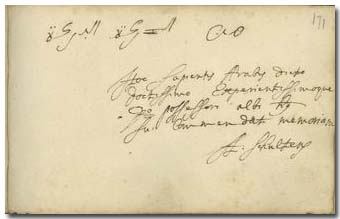

Hoc sapientis Arabis dicto doctissimo Experientissimoque D[omin]o
possessori albi hujus su[am] commendat memoriam
A. Schultens.
|
* Min al-haraka al-baraka. A
known Arabic proverb. The word ‘motion’ also meaning ‘travel’
might here refer to peregrination.
|
|
|
Blessing [is] in the motion.
With this saying of the wise Arab I recommend myself into the
memory of the learned and experienced possessor of this album
A. Schultens
|
p.
171. [Franeker? September 1719]
Schultens, Albert
(1686-1750), Dutch theologian,
orientalist
Albert Schultens was born on August 22, 1686 in Groningen. He
learned in his native town, and disputed as early as at the age of
16, in 1702. Then he studied in Leiden and Utrecht, and he
defended his theological dissertation in 1709 in Groningen. In
1711 he became pastor of Wassenaar (Zuid-Holland). In 1713 he was
appointed professor of Hebrew language and archaeology at the
university of Franeker; in 1717 he also became the pastor of the
university. In 1729 he was invited to Leiden to be appointed
regent of the Dutch college of theology, the so-called
Staten-College. From 1732 he was professor of Oriental languages,
and from 1740 also of Hebrew antiquities. He died on January 26,
1750 in Leiden. His son Jan Jacob Schultens (1716-1778) and his
grandson Henrik Albert Schultens (1749-1793) were also renowned
orientalists, and sustainers of his oeuvre. He was a renewer of
linguistic thought and founder of Semitic comparative philology,
in which he got much ahead of his own age. Both in his inaugural
address in Franeker and in his first important work (1724) he
exposed his principles and his scholarly program: laying new
foundations to Hebrew philology, surpassing Rabbinic and Christian
traditions, comparing it to related languages, principally with
Arabic, and clarifying the meaning of words in this context and in
the knowledge of mutual influences; it is not enough to learn from
the language of the Old Testament, because the meanings adopted
here are in many cases secondary – for this would be like knowing
Latin only from the language of Cicero. Besides his addresses, he
also wrote a large number of works in biblical, Hebrew and Arabic
philology, for example: Disputatio de utilitate
linguae arabicae, 1702, in: Opera minora. Leiden,
Leeuwarden, 1769. – Origines Hebraeae sive Hebraeae linguae
antiquissima naturae et indoles ex Arabiae penetralibus revocata:
liber I, II. Franeker, 1724, 1738. – Animadversiones
philologicae et criticae ad varia loca Veteris Testamenti …
Amsterdam, 1709. – De defectibus hodiernis linguae hebraeae
…, Franeker, 1731. – Haririi … consessus VI … emissi ac
notis illustrati … Accedunt monumenta vetustiora Arabiae …
(Arab. et Lat.). Franeker, 1731-1740. 3 pt. – Oratio
inauguralis de tabernaculo Mosis, Leiden 1740 – Institutiones ad
fundamenta linguae Hebraeae, quibus via panditur ad ejusdem
analogiam restituendam, et vindicandam. Leiden, 1737. Editio
2: Kolozsvár, 1743. – Gemina oratio de linguae Arabicae
antiquissima origine, intima ac sororia cum lingua Hebraea
affinitate, cognatione nullisque seculis praeflorata puritate,
1738. – Vita et res gestae Sultani Saladini,
Leiden 1755.
Albert Schultens did not date his short memento. Ferenc Páriz
Pápai immatriculated in Franeker in 1718 [AlbFran 312, Graaf 64].
Professor Schultens supposedly made his note in the album at the
same time with the other professors of Franeker, Vitringa Sen. and
Jr., Muys, ab Andala and Latané
(pp. 325,
125,
127, 129,
431), in September 1719.
•
Boeles II 380 • Jöcher • Michaud • NNBW V 707 |

